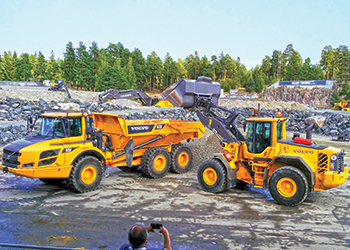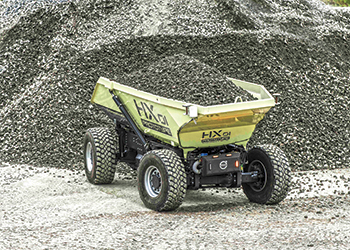
 The HX1 autonomous load carrier ... futuristic concept.
The HX1 autonomous load carrier ... futuristic concept.
Volvo CE has teamed up with various organisations to address efficiency issues in quarries and work on an electric site solution to increase productivity and reduce emissions at the sites.
“There have been significant improvements over the years in the machines used in quarries and construction sites. They are now more comfortable, bigger, faster and fuel efficient,” says a Volvo CE spokesman. “However, the way quarries are run has not changed much. The processes remain almost the same and there are inefficiencies at different levels.”
To tackle some of these issues, Volvo CE has presented its electric site solution and unveiled the new concept HX1 autonomous, battery electric, load carrier at the Xploration Forum.
Other partners in this initiative include its customer Skanska Sweden, the Swedish Energy Agency and two Swedish universities – Linköping University and Mälardalen University.
The prototype machine is one element of the electric site research project that predicts up to a 95 per cent reduction in carbon emissions and up to a 25 per cent reduction in total cost of ownership.
The project aims to electrify the quarry from excavation to primary crushing and transport to secondary crushing. It involves developing new machines, work methods and site management systems. As well as a fleet of HX1s, other prototype machines that make up the electric site system include a hybrid wheel loader and a grid-connected excavator.
New technology encompasses machine and fleet control systems and logistic solutions for electric machines in quarries.
“This research project is a step towards transforming the quarry and aggregates industry,” says Johan Sjöberg, technical specialist in site automation at Volvo CE. “By using electricity instead of diesel to power construction equipment in a quarry we have the potential to deliver significant reductions in fuel consumption, CO2 (carbon dioxide) emissions, environmental impact and cost-per-tonne. The electrification of construction equipment will produce cleaner, quieter and more efficient machines – this represents the future of our industry.”
The project is due to be completed in late 2018. Volvo CE is currently developing and testing the technologies, concept and prototypes in-house. Skanska Sweden will incorporate the demonstration machines into its operations and test the electric site concept at a quarry in western Sweden, for 10 weeks at the end of 2018. After this, Volvo CE will examine the project results to see if the concept is viable for the industry. Currently this work is just a research project, with no plans for industrialisation at this stage.





















_0001.jpg)


.jpg)
















.jpg)








.jpg)



.jpg)